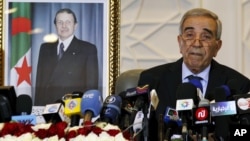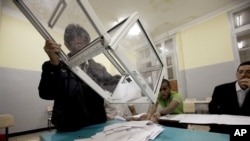CAIRO, Egypt - Algeria on Friday declared its ruling party the winner of a parliamentary election.
Interior Minister Daho Ould Kablia announced the winners from Thursday's vote, saying that the country's Constitutional Council would have 10 days to officially ratify the results.
He says that the country's ruling National Liberation Front won 220 seats. An alliance of moderate Islamists claimed 66 seats and disputed the results.
The National Alliance Party party of Prime Minister Ahmed Ouyahia claimed second place with 68 seats, the Green Alliance won 48, the Socialists won 21, and the Worker's Party won 20.
Kabila said voter turnout was 44 percent, compared to a record low turnout of 37 percent in the 2007 elections. He said the elections went relatively smoothly except for "several small incidents or verbal disputes" that were "resolved quickly."
But Islamic parties said there was "widespread fraud."
About half of the 44 political parties that competed were legalized this year. A stronger Islamist victory, in Algeria's first elections since the Arab Spring, would have echoed trends in Morocco, Tunisia and Egypt.
Opposition activists citing ongoing distrust of promised government reforms had urged voters to stay away from the polls.
Despite the fraud claims, the head of a team of European Union election monitors, Jose Ignacio Salafranca, said that there were few irregularities.
He says that voting generally took place under satisfactory conditions and that observers were present at both the opening and closing of polling stations. He said polling places were generally well-equipped and that polling workers were well-prepared..
One woman who voted in the capital Algiers, however, complained that there were a number of glitches and that she came away frustrated by the voting.
She complains that she had her voting card but wasn't able to find her name on the electoral roll. No one, she adds, was around to help her resolve the problem.
Abu Jarah Sultani, who heads the Society for Peace Movement, said that the election was an opportunity for Algerians to create their own "Arab Spring."
He says that the vote was a referendum on the Algerian reform movement and an opportunity for Algerians to build a future beginning in the voting booths.
While Islamists hoped for a better showing, Khattar Abou Diab, who teaches political science at the University of Paris, said it was not likely.
He said that for the most part Islamic fundamentalist parties are not going to ride a tidal wave to power as they did in Tunisia and Morocco, because they are seriously divided. He adds that even if they had made a stronger showing, they would have been forced to form alliances with two more conservative parties.
President Abdelaziz Bouteflika has announced a series of constitutional reforms after pro-democracy protests erupted last year. The new parliament will vote on proposed constitutional changes and lay the groundwork for presidential elections in 2014.
Interior Minister Daho Ould Kablia announced the winners from Thursday's vote, saying that the country's Constitutional Council would have 10 days to officially ratify the results.
He says that the country's ruling National Liberation Front won 220 seats. An alliance of moderate Islamists claimed 66 seats and disputed the results.
The National Alliance Party party of Prime Minister Ahmed Ouyahia claimed second place with 68 seats, the Green Alliance won 48, the Socialists won 21, and the Worker's Party won 20.
Kabila said voter turnout was 44 percent, compared to a record low turnout of 37 percent in the 2007 elections. He said the elections went relatively smoothly except for "several small incidents or verbal disputes" that were "resolved quickly."
But Islamic parties said there was "widespread fraud."
About half of the 44 political parties that competed were legalized this year. A stronger Islamist victory, in Algeria's first elections since the Arab Spring, would have echoed trends in Morocco, Tunisia and Egypt.
Opposition activists citing ongoing distrust of promised government reforms had urged voters to stay away from the polls.
Despite the fraud claims, the head of a team of European Union election monitors, Jose Ignacio Salafranca, said that there were few irregularities.
He says that voting generally took place under satisfactory conditions and that observers were present at both the opening and closing of polling stations. He said polling places were generally well-equipped and that polling workers were well-prepared..
One woman who voted in the capital Algiers, however, complained that there were a number of glitches and that she came away frustrated by the voting.
She complains that she had her voting card but wasn't able to find her name on the electoral roll. No one, she adds, was around to help her resolve the problem.
Abu Jarah Sultani, who heads the Society for Peace Movement, said that the election was an opportunity for Algerians to create their own "Arab Spring."
He says that the vote was a referendum on the Algerian reform movement and an opportunity for Algerians to build a future beginning in the voting booths.
While Islamists hoped for a better showing, Khattar Abou Diab, who teaches political science at the University of Paris, said it was not likely.
He said that for the most part Islamic fundamentalist parties are not going to ride a tidal wave to power as they did in Tunisia and Morocco, because they are seriously divided. He adds that even if they had made a stronger showing, they would have been forced to form alliances with two more conservative parties.
President Abdelaziz Bouteflika has announced a series of constitutional reforms after pro-democracy protests erupted last year. The new parliament will vote on proposed constitutional changes and lay the groundwork for presidential elections in 2014.










